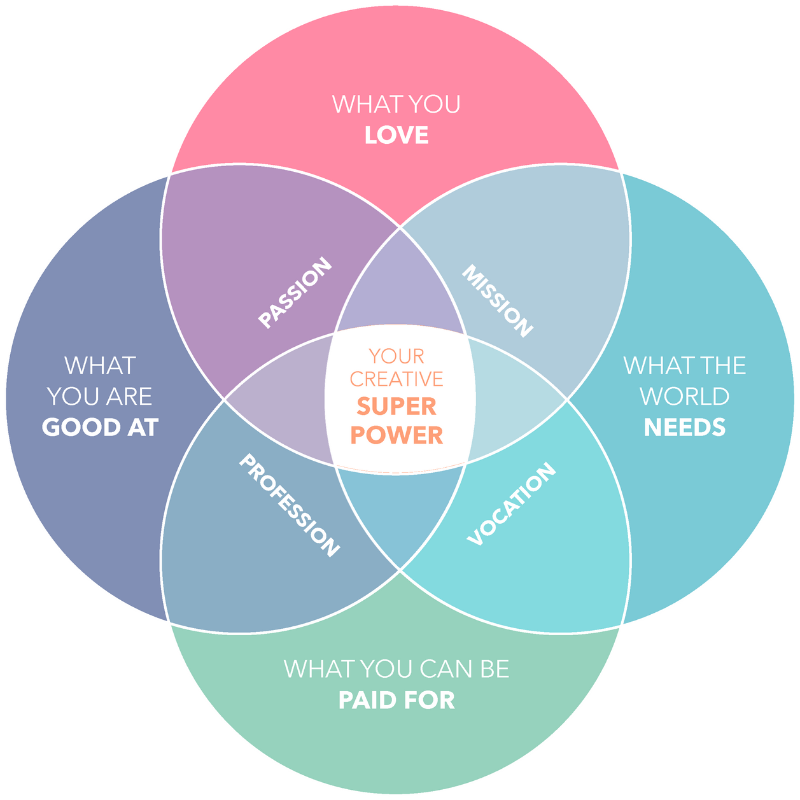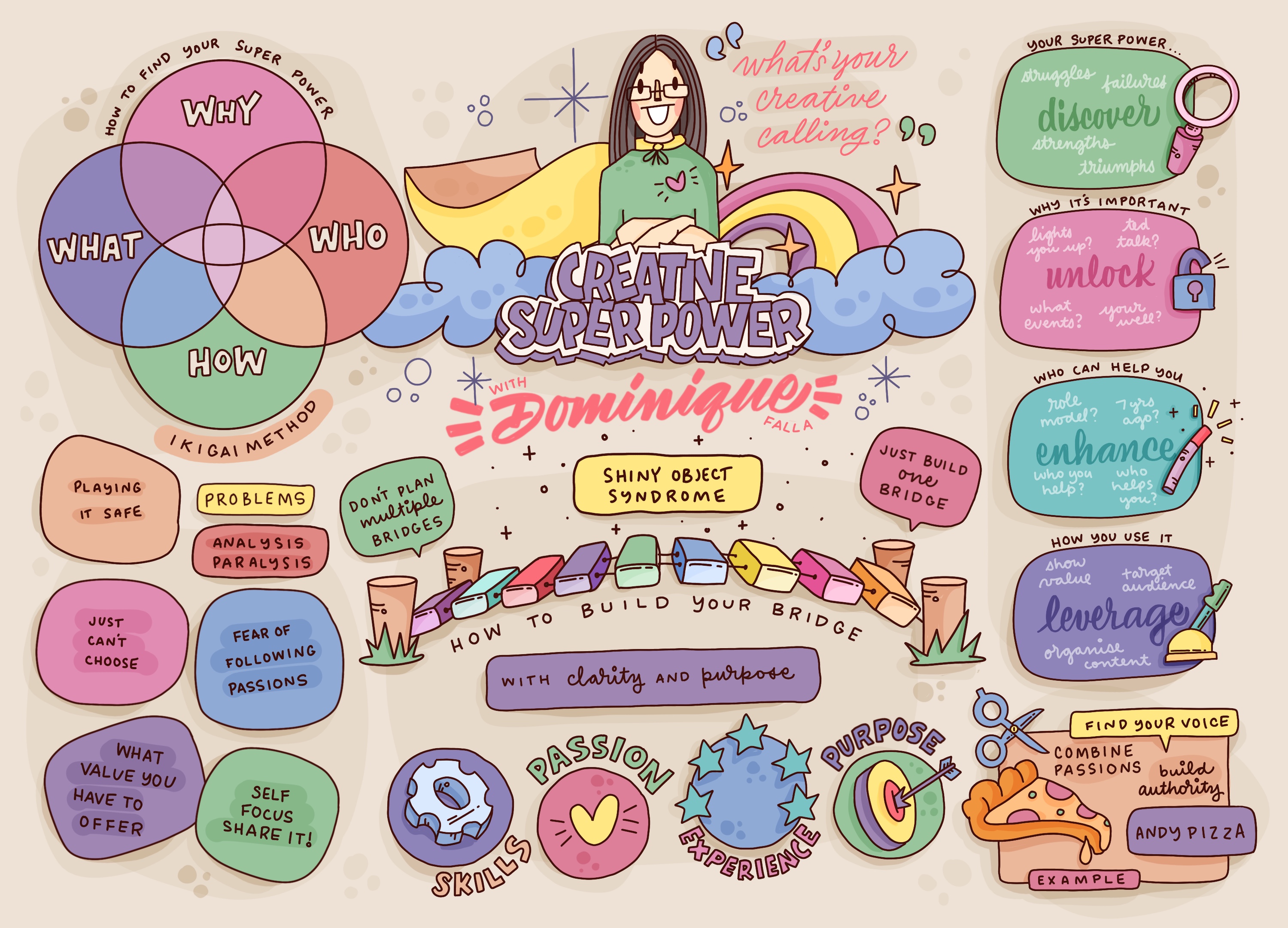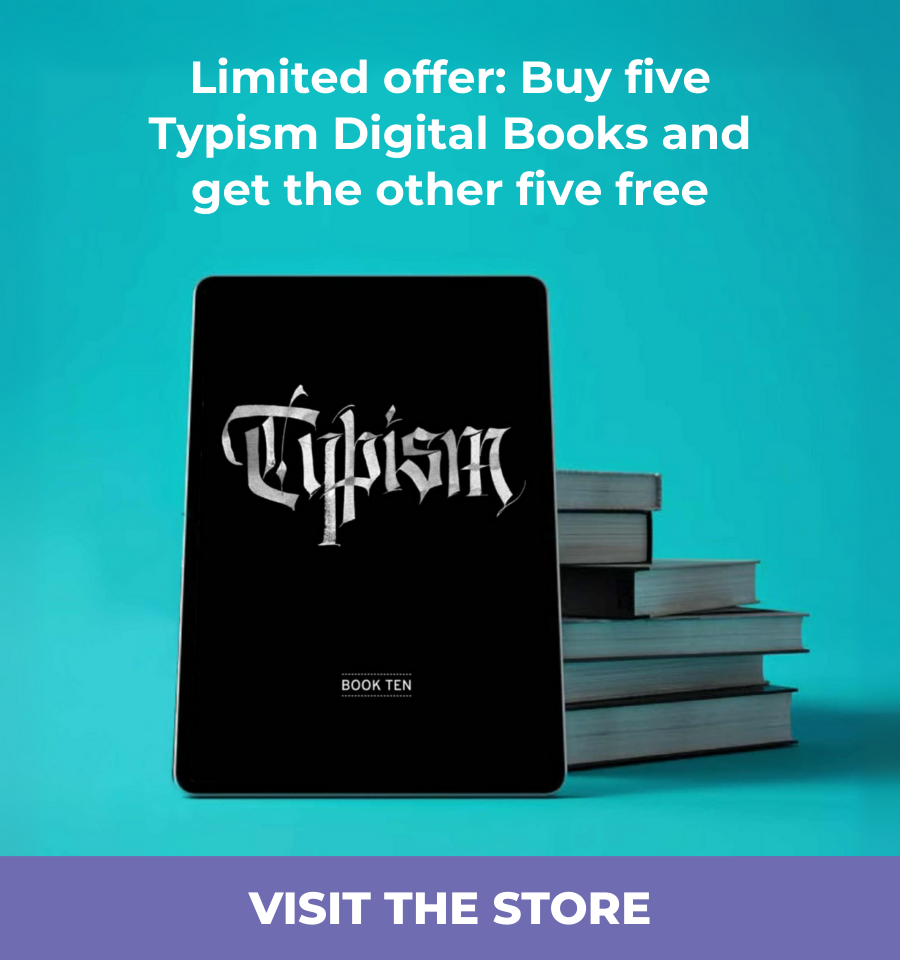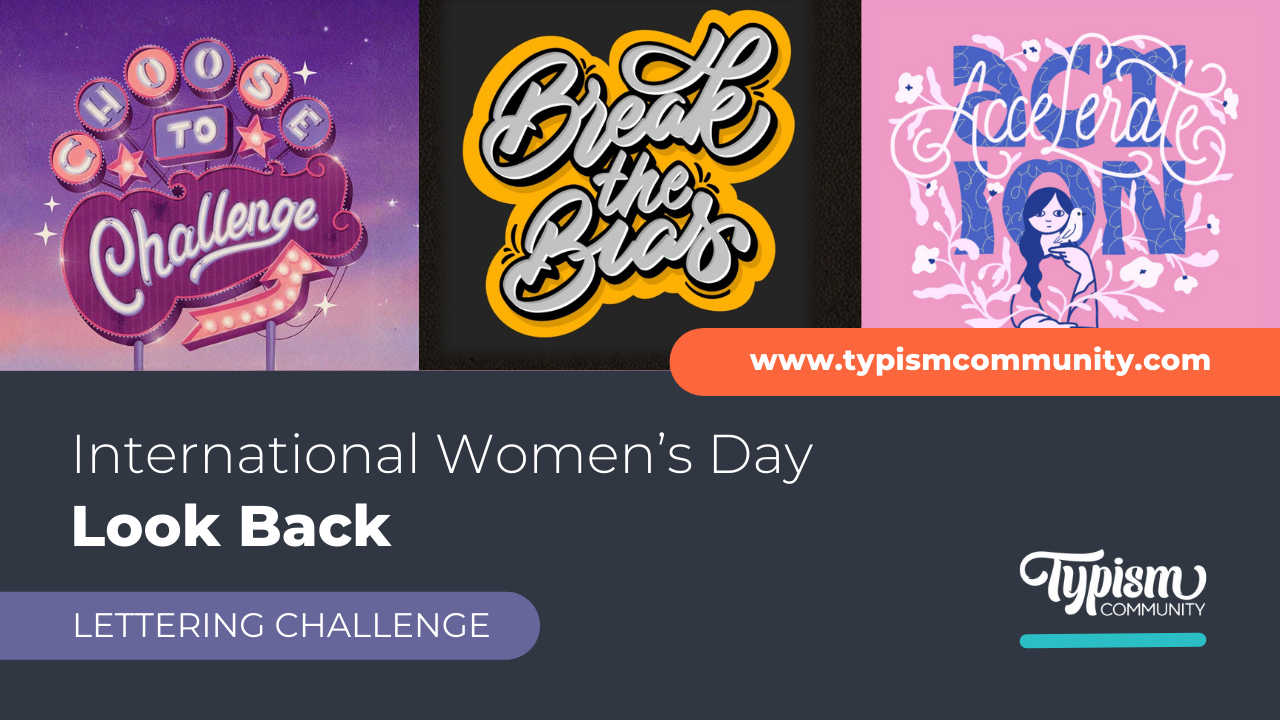Typism Summit Q&A: Dominique Falla
Oct 01, 2022Typism held a wonderful free summit in July, and we heard from some incredible type and lettering artists over the three days.
You can still access the summit videos here, but we felt so much gold was shared in the live 15-minute Q&A sessions after the talks that we would share some of them with you as well.
Typism founder Dominique Falla hosted all the Q&A sessions, but when it was her turn to speak, we asked Aurelie Maron to run the Q&A session and loved their conversation. You can watch it above or read the transcript below.
Dominique spoke about using this overlap diagram based on the Ikigai to help you discover your Creative Superpower and build your business on a solid foundation.

Another of the Typism Summit speakers, Libbi Reed, created a sketch note of Dominique's Creative Superpower talk, which you can see below.

Aurelie: I want to say, before we start, thank you so much for doing all of this (The Typism Summit). I've been enjoying watching every single talk, every single Q and A.
Dominique: You've been in every single one. I'm so impressed.
Aurelie: It's been awesome. I think it's been a really good conference because I think there was a key takeaway in every talk, like a little nugget of information that I could instantly start doing. Just change something on my website, or start doing something like a promotion on Etsy, start making more sketch notes ... everything. So it's awesome, and I think everyone will agree with that.
Dominique: The whole point of the summit is definitely for it to be actionable because I think I've been to enough conferences where people tell their life stories. It's very inspiring if you are young, but when you're getting on a bit and have limited time, you're like, "just tell me what I need that's going to help me".
Aurelie: What do I need to do right now? Yes. I have a list of all the things I'm going to do next week, which is awesome.
So I watched your summit video just then. I had to watch it in a sped-up mode to get through it in time ...
Dominique: ... and I talk fast enough as it is.
Aurelie: So yeah, you're the queen to help people discover their Creative Superpower, and I have done your course. I started in 2019, and everyone knows. I wouldn't be here if it weren't for, like, you are the one who helped me find my Creative Superpower, find my creative spark and be here and do what I do today. So if you're still thinking of joining Dominique's class, she's the one for that.
But I have a question for you because when I started, I had some ideas like I answered all of your questions that you go through in the video. And I had some specific answers, but over the years, they changed, and what I was doing in 2019 is different to what I do now.
So my question is: how do you know if you're on the right path? I think a lot of people will benefit from that answer, but how do you know if you are on the right path and going the right way and on the right track?
Dominique: I think the answer came from; I can't remember whose talk it was, maybe Peggy's yesterday, that you can't steer a parked car. I covered it in my talk that most of us are just stuck, and it's either in analysis paralysis—I don't want to make the wrong choice, so I'll make no choice.
That's not me. I'm not there. That's, that's other people. I'm the other one. So I run around, and I have so many ideas, and I can't choose because I'm so worried that the other ones won't get done or they'll get forgotten. So I do them all.
As a result, you're half building five bridges or half digging five holes; instead of really focusing and just saying for one season, maybe let's focus on this thing. And so, I had trouble deciding which one I should choose at the expense of the others that I'm still excited about.
So I think if you are in that situation, this method helps you combine as many as possible. Some, you might have to leave to the side, but rather than choosing just one or not having an effective system to choose from, this should give you a way that you can highlight and identify. It's like, okay, I like making, you know, spaghetti earrings, but then when you go around the circles, you're like, well, this doesn't help anybody, and nobody cares. That's when you go, well, that's maybe a hobby or some fun thing to put aside.
It's just a way of validating and helping you make decisions—instead of just going round and round in a circle and making none or running yourself ragged because you're trying to do all of them instead of pre-validating. Does that make sense?
Aurelie: Yes, totally because, I think like you were saying, many people get stuck trying to get started. I think I have the shiny object syndrome as well; I try a lot of things. But yeah, I think that made sense what you said.
Dominique: But I think your shiny object syndrome now is feeding the beast. You've got this theme. I think you're getting new ideas, but they all go into that one circle.
Aurelie: I think the worst is paralysis analysis, not doing anything. It's better to do something wrong than not do anything.
Dominique: Yeah. I agree. But, the other way is exhausting, and I have found that if I call them seasons, I write out, you know, what are all the things you want to do? Just so that Dominique's brain doesn't feel like, oh, you've forgotten something. So I write them all down, and then I put them in order.
I've mentioned to you before that I want to start a YouTube channel, but it's on the list, but it's far away, so at least in the back of my brain, it doesn't say, "Oh, don't forget the YouTube channel". So it just stays over there, but our strategy is around this at the moment.
So, therefore I can say, this is the season of the podcast, or this is the season of doing that. So, when we get to the season of building your Kajabi YouTube channel, that's when you're going to get to that.
And I think that calms down my "yeah, but" brain instead of doing all of them and starting all of them and trying to get all of them happening.
Aurelie: Yeah, I think that's something like one of the key takeaways I got from all of those talks as well, is that you should really like get out of your head and put everything down on paper.
And I think every single talk said the same thing: you have to go for it, write everything down, and put everything on paper, so you don't get overwhelmed. So, yeah, I think that is the key takeaway from this summit.
I think we've got a question from Ferlix; there are a lot of ideas I want to try on my product or work. Is there any way to combine those ideas, or is it better to eliminate some of them?
Dominique: So I think the first step of the process is to work out what all of those ideas are. And as Aurelie said, you've got to write them down and include them. So for many people, some ideas they think are stupid, their personal stuff, or their hobbies. And I think what we've seen, especially with Tamer (Ghoneim) and Scotty (Russell), there are a few people where the silly things are parts of their personality, such as liking pizza or Star Wars, you know, the things that you like. Still, you think they are separate from work, but in that first section of the circle, you bring everything to the party.
It all comes with everything you're interested in, and for Aurelie, there's pole dancing, and there are cats, and there's pink. There are all of these other things that might not necessarily belong in a professional work situation. But when it's your personal work situation, absolutely bring everything in; you might not know where it fits just yet, but it needs to be included.
I think the Goodtype girls were also talking about it. You can't have five separate Instagram accounts; stop segmenting and separating because you're embarrassed about some of the bits. You have got to make it one focused thing. And that core central thing is you, and then you bring them all together. Then the next half of the creative superpower circle—so those first two things are your skills, aptitudes and passions, however weird or quirky left-of-centre they might be—and then the second part is where you run it through a validation filter. How does this help other people? How can this motivate and inspire other people? And how can you turn that into something transformational for people, which you can then ask for money for, making it sustainable?
So it's all very good to have a hobby, but it will get pushed to the side if you can't make money from it.
Aurelie: Exactly. I think that's what they were saying about like the spaghetti. Like you throw everything at the wall. Put everything out there and see what sticks, what people resonate with and ask you about.
I like this saying in your presentation; you said, "creativity should be shared", and I thought that was awesome. That's so true; instead of just creating for you, which is what we all do, at the end of the day, you should also share it with the world. So not just for the money, but to help others, and I think that's where the money comes from in the end.
Dominique: Absolutely. And I think it's just a confidence thing. It's just that we think that some things need to be sensible or the right way, and then others are our own personal things. And I think it's a real confidence issue too. So get all of that stuff and bring it and share it.
We want it to be perfect. We want it to look as good as this person or that person, and it takes a lot of bravery to share the shit, you know, stuff that's in progress. But that's where we learn and grow, and that's when you get people to relate and identify with you.
Aurelie: If anyone is thinking of joining Dominique's course, she will brainwash you into believing in yourself and knowing you can achieve anything.
Dominique: It's true. And that's why my podcast is called Creative Spark podcast. I love finding the spark in somebody and getting them to stop being distracted by other things. This is the thing that you need to do. Build that fire, and get that going.
Aurelie: You've helped me with that. You've helped Jasmine and Libbi and the other summit speakers.
Wayne's got a question. Do you have any advice about your personal brand's role in promoting your work?
Dominique: I think it's essential. I mean, Goodtype covered it in their talk. I believe that—unless you represent a company, like if you work for Griffith University or something, and you've got your professional hat on, then that's one thing—but for your own work, if it's your own business, brand, or company, you need to develop that confidence to step outside that and be the face of your brand.
And look, I struggled with that for quite some time because when I built Typism, stepping outside of the brand, you know, becoming the face of your brand is essential. As we said earlier, it's not Perspective Collective talking to Typism; it's Scotty talking to Dominique.
It's not Goodtype talking to Typism; it's Ilana and Katie talking to Dominique. There are people behind the brand.
If people aren't buying you, you are just competing on price. You're commoditizing your product, and you're competing on price. Whereas there are lots of people who teach procreate lettering. There are lots of people who have to procreate brushes, but we gravitate towards the ones which we like.
If you are judging the products, they're all perfect products. So it's got to be about the personality behind the design. And especially when it's creative output, knowing the creative person that's made to this thing you are interacting with it's essential.
Aurelie: Yeah, I agree. I think people struggle with knowing what to put out there. They get scared; they worry that they are not good enough and are not sure they will be received well. So I think that's where people get stuck. Do you have any advice on that? How do you overcome that?
Dominique: It's much more fun to fail in front of nobody. So if you start from nothing, make mistakes, like publish rubbish and go, oops. That was a bad idea because four people were going to pay attention.
So the issue becomes when it's the first album success problem. If a band releases the first album, it goes gangbusters and wins a Grammy; that's when you get the pressure; Billy Eilish, her second album. Talk about pressure because everybody's looking, but for most of us, when we're starting, nobody's paying attention. So go hard, go fast, and make all the mistakes whilst only seven people are watching. And if they're your friends, they're just going to tell you to pull your head in any way.
Aurelie: That's very true. Rather than later, I think people compare themselves to people who are already successful and think that everything they do is easy. They're not worried about anything. They just put something out there, but it's not true. Like, I think the more you grow, the more. You still get nervous. You still get stuck and stressed about posting and putting something out there. But yeah, as you said, people will tell you, and you'll get the feedback, and you learn from there.
Dominique: And you've got to do it to improve. My favourite thing to do when I'm feeling this sort of insecurity is to watch old Marie Forleo videos. Marie Forleo, if you don't know her, she's the host of MarieTV. She is the most polished—beautiful, perfect hair from a hair salon in a studio.
So if you watch her videos from seven, eight years ago, go and find them on YouTube, and it's her perched on a stool in her little Brooklyn apartment in front of a dodgy brick wall. And as the trucks go past, the lighting changes. I mean, it's the crappiest video you've ever seen. And, where she started, and now she's MarieTV. So everybody starts somewhere, and we don't always get to see it, but when I can find the beginnings, I love going back and reassuring myself that yeah, they were shit too. So we all start somewhere.
Well, I think that's probably our time's up. Thank you so much, Aurelie, for interviewing me. This could've been awkward (interviewing myself), so thank you for jumping in at such late notice.
Stay connected with news and updates!
Join our mailing list for the latest updates about Typism Summits, Books, Membership News, and the Latest Lettering Challenges.
We hate SPAM. We will never sell your information, for any reason.





